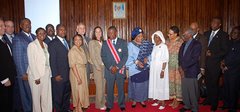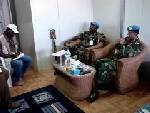THE HAGUE, Netherlands: Dozens of witnesses will be called in Charles Taylor's trial to link the former Liberian president to atrocities committed during Sierra Leone's civil war in the 1990s, Chief Prosecutor Stephen Rapp said Wednesday.
Those witnesses include insiders claiming to have seen Taylor instigate and give orders leading to war crimes, Rapp said.
The long-awaited trial begins Monday with the prosecution's four-hour opening statement, then will adjourn until June 25 when it will hear the first of the 150 witnesses the prosecution plans to summon to the stand.
Taylor's defense will give its opening statement after the prosecution rests its case, in about one year, Rapp said. The trial should take about 18 months before the judges retire to consider their verdict.
Taylor, 59, is facing 11 charges of terrorism, murder, rape, sexual slavery, mutilation and recruiting child soldiers. He has pleaded innocent to all counts.
He was arrested last year and flown to the Netherlands amid fears that staging his trial in Sierra Leone, where the court usually sits, could trigger fresh unrest or even attempts by his supporters to break him out of prison.
Of the 150 scheduled prosecution witnesses, 62 will testify "to Taylor's control, to his orders, to his instigation, to his plans, to his provision of assistance of arms, training, safe refuge to the rebels, with full knowledge of the atrocities they were committing to the civilian population," he told the Netherlands-based Foreign Press Association.
Some of those witnesses were from Taylor's inner circle. Some may have shared responsibility for crimes, but were not being prosecuted because the court chose to pursue only those most responsible, he said.
Most of them will testify under pseudonyms to protect their identities from public disclosure, though the defense will know who they are. Some will be eligible for relocation after the trial to avoid retribution.
During a pretrial hearing three weeks ago, defense attorney Karim Khan said potential witnesses feared leaving Sierra Leone to testify on Taylor's behalf for fear of identifying themselves as his associates and exposing themselves to possible U.N. sanctions.
Khan also complained that the two defense lawyers and three legal aides were outgunned by the 10-man prosecution team. Taylor, although he was reported to have stashed away huge wealth from his years in power, has declared himself unable to pay for his own defense team and relies on court-appointed counsel.
Operating from his residence in Monrovia known as White Flower, Taylor never entered Sierra Leone during the conflict, making it a challenge for the prosecution to link him to the actions of rebel forces.
"We don't say he chopped off any hands himself. We don't say he shot anybody himself," Rapp said. "We have a variety of evidence showing that these people (the rebels) viewed Taylor as the boss man, as the person responsible," Rapp said.
The upheaval in West Africa "was a kind of terrorism," he said. "It was, in our view, a systematic attack against civilians with the intent to take control of Sierra Leone."
The Special Court for Sierra Leone has no maximum sentence. Life imprisonment is not in its statute, but Taylor could be sentenced to a term that would leave him jail for his expected lifetime. Under a U.N. sanctioned agreement, Britain has agreed to imprison him if he is convicted.
Subscribe to:
Post Comments (Atom)



No comments:
Post a Comment